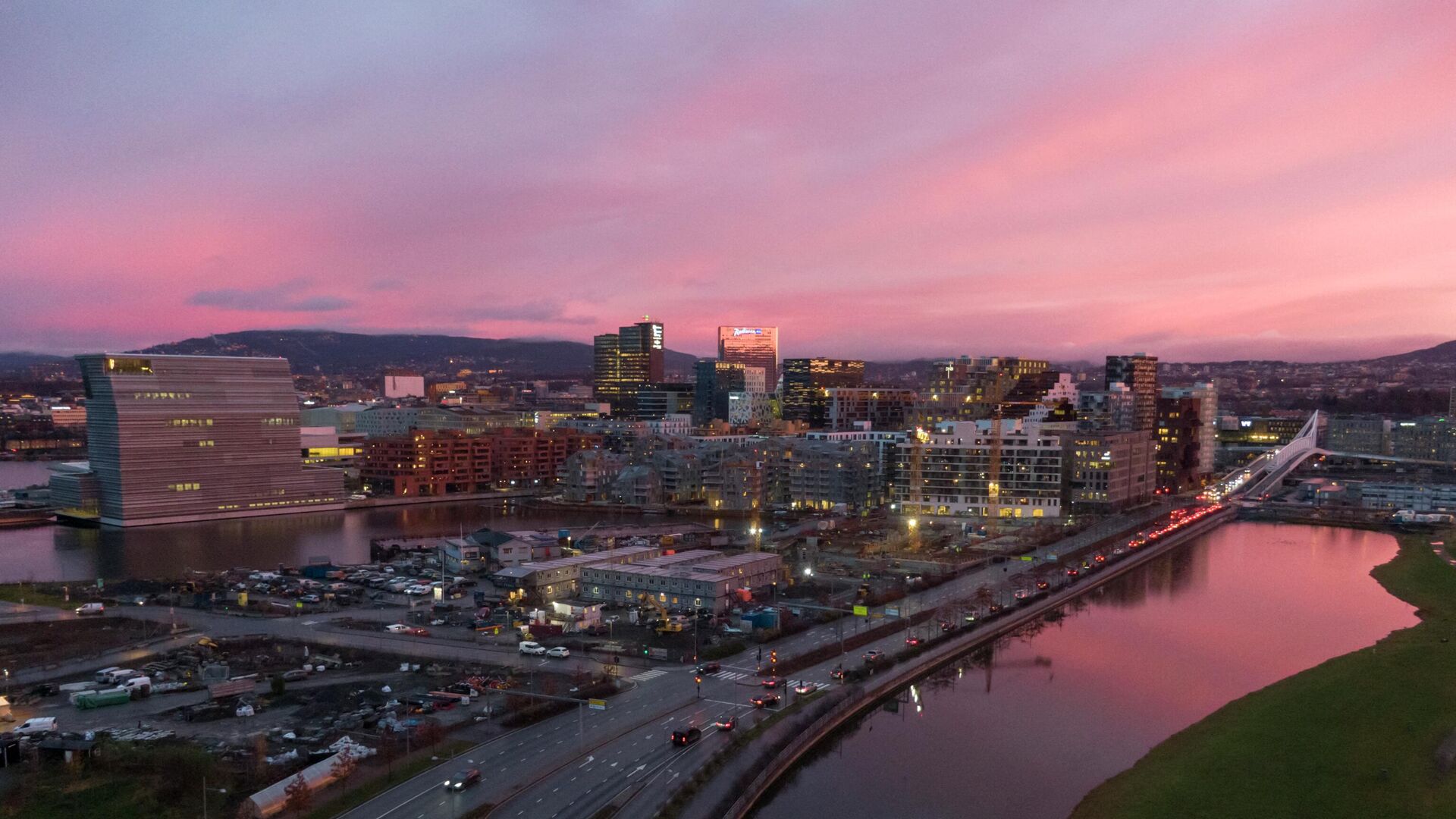https://sputnikglobe.com/20221011/denmark-norway-see-record-double-digit-inflation-1101703596.html
Denmark, Norway See Record Double-Digit Inflation
Denmark, Norway See Record Double-Digit Inflation
Sputnik International
Denmark’s central bank warned that soaring inflation poses the biggest threat to the economy, envisaging a recession in the next year as well as the... 11.10.2022, Sputnik International
2022-10-11T05:25+0000
2022-10-11T05:25+0000
2022-10-11T06:39+0000
energy crisis in europe
economy
newsfeed
europe
denmark
norway
energy
inflation
https://cdn1.img.sputnikglobe.com/img/07e6/0a/0b/1101705184_0:94:3073:1822_1920x0_80_0_0_51dbc4dd7397818bd9e00a6724359845.jpg
Denmark’s inflation rate has jumped to double digits for the first time in four decades, reaching 10 percent in September, Statistics Denmark reported.According to the number-crunching agency, electricity and gas prices were once again the main reasons for the rocketing inflation.Stramer attributed the inflation to the conflict in Ukraine, with mutual restrictions imposed between the EU and Russia, as well as a “perfect storm” of a high demand after the COVID-19 crisis, supply problems and an energy pinch.Denmark’s central bank said last month that rising inflation poses the biggest threat to the economy which it is expecting to shrink over the next year, and called on the government to tighten spending dramatically to avoid a self-reinforcing wage-price spiral.With inflation rates at their highest since 1982 and consumer confidence at the lowest since the data set was introduced in the early Seventies, the Chamber of Commerce expects private spending to fall in winter, with overall activity in the Danish economy following suit.According to Stramer, inflation is expected to peak this month at around 11 percent and gradually recede thereafter. However, it is bound to stay high and not return to a normal level until at least summer 2023.A similar pattern emerged in fellow Nordic country Norway, which saw the the biggest jump in food prices since the start of the Eighties at 12.1 percent. Although the overall inflation rate reached 6.9 percent in September, Statistics Norway said it had to go back to 1988 to find higher annual growth.The high rate of inflation indicates that the country's Central Bank must act harder and use more “gunpowder” to calm the Norwegian economy, economists said.“This increases the probability of a new interest rate increase of 0.5 percent in November. Today's figures mean that the Central Bank is far from finished raising interest rates,” Nordea Markets chief economist Kjetil Olsen told NRK.Norway's Central Bank has already raised the interest rate by 0.5 points three times, expecting price inflation to fall. Norway, however, is in a league of its own concerning Europe's energy prices as it has supplanted Russia as the EU's chief exporter of energy, after Brussels' ill-conceived sanctions against Moscow meant as “punishment” for Russia for launching its special operation in Ukraine - a position cemented by the explosions on the subsea Nord Stream 1 and 2 pipelines, which Russia called a deliberate assault on Europe's energy infrastructure and an act of international terrorism.Norway, now a key player on the European energy market, is expected to cash in on the oil and gas industry and earn about $110Bln this year alone, most of which will go to its sovereign wealth fund worth more than $1 trillion which has led to members of the bloc, including Poland, accusing Norway of profiteering and sadly lacking in solidarity.In less well-off regions of Europe that lack Norway's huge resources, such as the Baltics and Moldova, inflation has exceeded 20 percent amid towering energy and cost-of-living crises. This is coupled with frantic measures to limit energy spending across the bloc that include dimmed lights and lowered heating.
https://sputnikglobe.com/20221003/probably-uncomfortable-for-most-people-denmark-lowers-down-inside-temperature-to-save-energy-1101450132.html
https://sputnikglobe.com/20221005/norway-to-sink-temperature-at-train-stations-by-four-degrees-amid-power-supply-woes-1101519418.html
denmark
norway
Sputnik International
feedback@sputniknews.com
+74956456601
MIA „Rossiya Segodnya“
2022
News
en_EN
Sputnik International
feedback@sputniknews.com
+74956456601
MIA „Rossiya Segodnya“
Sputnik International
feedback@sputniknews.com
+74956456601
MIA „Rossiya Segodnya“
economy, newsfeed, europe, denmark, norway, energy, inflation
economy, newsfeed, europe, denmark, norway, energy, inflation
Denmark, Norway See Record Double-Digit Inflation
05:25 GMT 11.10.2022 (Updated: 06:39 GMT 11.10.2022) Denmark’s central bank warned that soaring inflation poses the biggest threat to the economy, envisaging a recession in the next year as well as the possibility of a self-reinforcing wage-price spiral.
Denmark’s inflation rate has jumped to double digits for the first time in four decades, reaching 10 percent in September, Statistics Denmark
reported.
According to the number-crunching agency, electricity and gas prices were once again the main reasons for the rocketing inflation.
“I didn't expect us to see two-digit inflation rates. I thought those belonged to the history books”, the Danish Chamber of Commerce senior economist Tore Stramer told newswire Ritzau.
Stramer attributed the inflation to the conflict in Ukraine, with mutual restrictions imposed between the EU and Russia, as well as a “perfect storm” of a high demand after the COVID-19 crisis, supply problems and an energy pinch.
Denmark’s central bank said last month that rising inflation poses the biggest threat to the economy which it is expecting to shrink over the next year, and called on the government to tighten spending dramatically to avoid a self-reinforcing wage-price spiral.
With inflation rates at their highest since 1982 and consumer confidence at the lowest since the data set was introduced in the early Seventies, the Chamber of Commerce expects private spending to fall in winter, with overall activity in the Danish economy following suit.
According to Stramer, inflation is expected to peak this month at around 11 percent and gradually recede thereafter. However, it is bound to stay high and not return to a normal level until at least summer 2023.

3 October 2022, 07:27 GMT
A similar pattern emerged in fellow Nordic country Norway, which saw the the biggest jump in food prices since the start of the Eighties at 12.1 percent. Although the overall inflation rate reached 6.9 percent in September, Statistics Norway
said it had to go back to 1988 to find higher annual growth.
“Price pressure is stronger than expected. Not just electricity, but many goods and services as well”, DNB Markets chief economist Kjersti Haugland told national broadcaster NRK.
The high rate of inflation indicates that the country's Central Bank must act harder and use more “gunpowder” to calm the Norwegian economy, economists said.
“This increases the probability of a new interest rate increase of 0.5 percent in November. Today's figures mean that the Central Bank is far from finished raising interest rates,” Nordea Markets chief economist Kjetil Olsen told NRK.
Norway's Central Bank has already raised the interest rate by 0.5 points three times, expecting price inflation to fall.

5 October 2022, 06:24 GMT
Norway, however, is in a league of its own concerning Europe's energy prices as it has supplanted Russia as the EU's chief exporter of energy, after Brussels' ill-conceived sanctions against Moscow meant as “punishment” for Russia for launching its special operation in Ukraine - a position cemented by the explosions on the subsea Nord Stream 1 and 2 pipelines, which Russia called a deliberate assault on Europe's energy infrastructure and an act of international terrorism.
Norway, now a key player on the European energy market, is expected to cash in on the oil and gas industry and earn about $110Bln this year alone, most of which will go to its sovereign wealth fund worth more than $1 trillion which has led to members of the bloc, including Poland, accusing Norway of profiteering and sadly lacking in solidarity.
In less well-off regions of Europe that lack Norway's huge resources, such as the Baltics and Moldova, inflation
has exceeded 20 percent amid towering energy and cost-of-living crises. This is coupled with frantic measures to limit energy spending across the bloc that include dimmed lights and lowered heating.




